REPOST -- CTP Episode of the Day - 04.03.06 – Millennium
Today's Cherished Episode: Millennium (7x05)
Original Air Date: November 28, 1999
Written By: Vince Gilligan & Frank Spotnitz
Directed By: Thomas Wright
Mulder and Scully enlist the aid of Frank Black to help prevent members of the Millennium Group from attaining an Armageddon New Year.
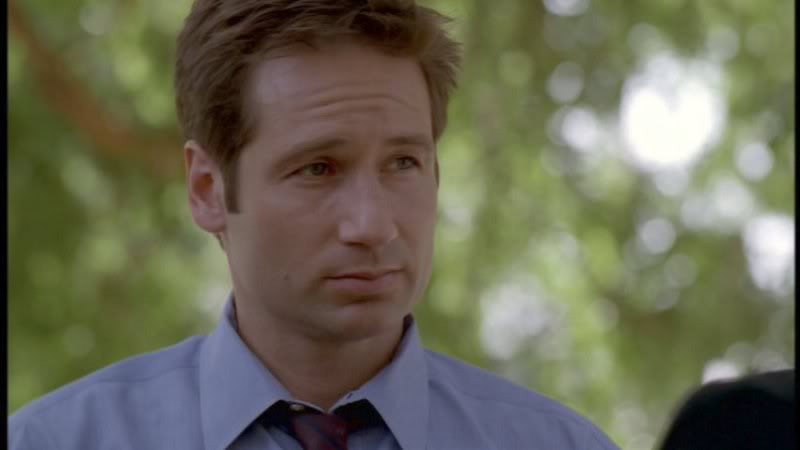
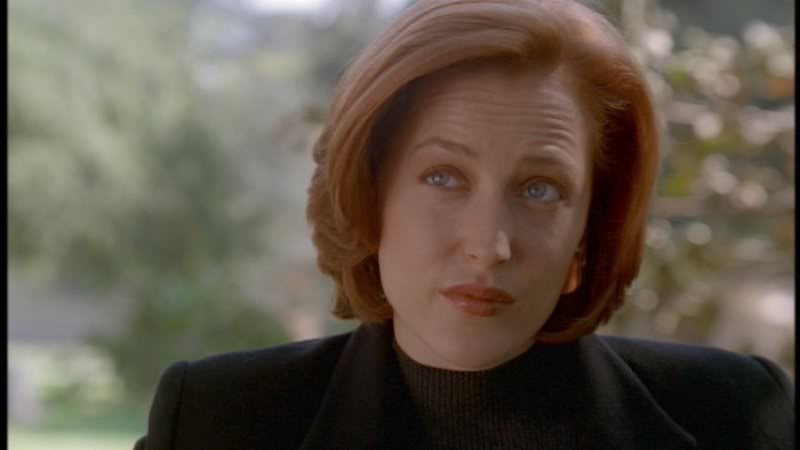
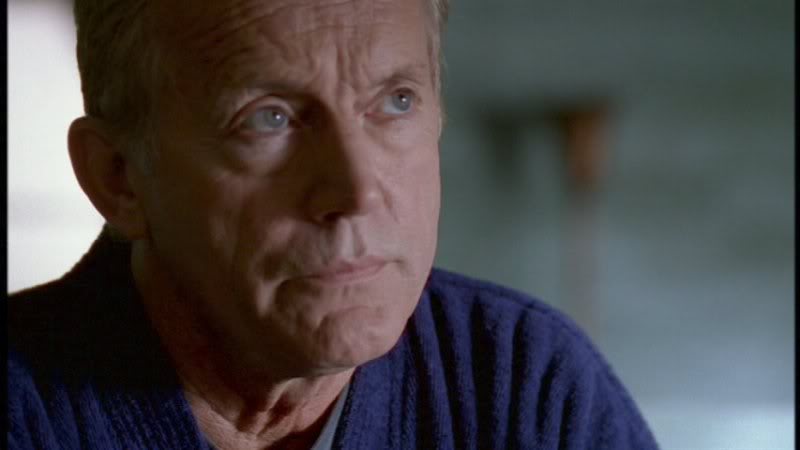
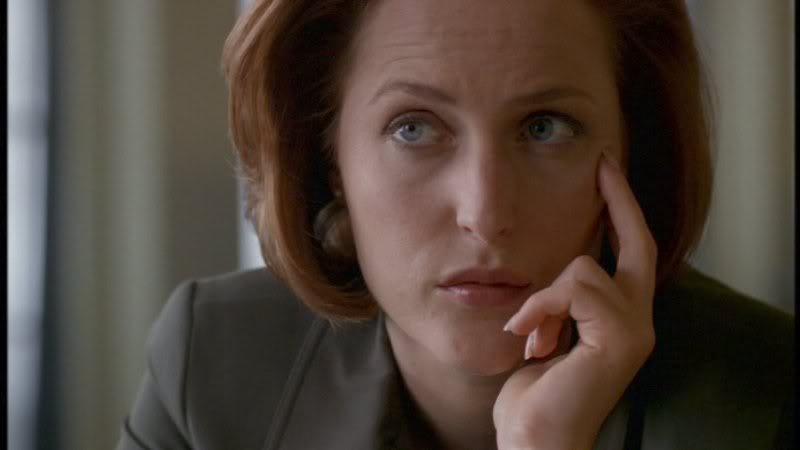
"Nobody likes a math geek, Scully."
-- It took seven seasons, but The X-Files finally got around to doing a zombie episode. Yet there was much more to the episode "Millennium" than merely raising the dead.
-- "The TV series Millennium ended before the millennium did," recalled Frank Spotnitz. "And we thought it was a shame that Frank Black didn't actually get to see the calendar change over. So we loved the idea of bringing Frank Black onto The X-Files so that he could see New Year's Eve 1999 change to New Year's Day 2000. But it was so hard because we were dealing with the mythology of The X-Files, the heroes of Mulder and Scully, the mythology of Millennium, and the hero of Frank Black. The question was how do you serve all those conflicting masters."
-- Chris Carter's much anticipated follow-up to The X-Files was Millennium, which premiered on Friday, October 25, 1996 (in the former time slot of X-Files which moved to Sunday nights early in its fourth season). Millennium focused on the work of ex-FBI profiler Frank Black, who had a special ability to see into the minds of serial killers. He also worked for a mysterious organization called the Millennium Group which seemed to take a special interest in end of the world prophecy. The series' last episode aired on May 21, 1999.
-- Millennium's three-year run on network television had been marked by critical acclaim, particularly for Lance Henriksen, and a group of viewers smaller than those for The X-Files but fanatically loyal. Initially a gritty, hard-core exercise in conspiracy and the impending apocalypse, the show transformed itself into a mythological exploration of fate during its second season before returning to a dark but straightforward voyage of discovery. The last episode of Millennium was shot before the show was officially canceled and so, according to Spotnitz, "there was never an end to the series proper."
-- Talk of doing an X-Files-Millennium crossover had begun while the show was still on the air. The biggest boosters were Frank Spotnitz and Vince Gilligan. "It suddenly became easier to do once Millennium went off the air," explained Gilligan. "From the beginning, the intention was not so much to wrap up Millennium as it was to answer the question of what would happen if Frank Black came into Mulder and Scully's world."
-- Spotnitz and Gilligan were tapped to script the episode and, in conjunction with Chris Carter and writer-supervising producer John Shiban, set about crafting a story. Shiban recalled that those story sessions were difficult to start, "Until we realized that the story needed to be an X-File and that any Millennium ending we came up with had to come second. We needed to do what we always did, which was to follow Mulder and Scully through their case."
-- Gilligan joked that "It wasn't about the plot as much as it was about getting these guys down in the basement of this creepy old house with these zombies climbing up out of the ground, and having to be shot in the head."
-- The resultant storyline, in which Mulder and Scully discovered a zombie-infested plot to kill off the surviving members of the Millennium Group and bring them back to life as the harbinger of the final apocalypse, was a well-crafted and dark outing. While fundamentally an X-File, the story also skillfully incorporated Frank Black's heretofore untold fate as a reluctant hero on the eve of the millennium who had voluntarily institutionalized himself to regain custody of his daughter.
-- Part of the inspiration behind the episode was all of the media hype predicting the end of civilization once the year 2000 began. "In the run up to the turn of the year, all these so-called experts were on every news outlet you could find talking about how once that clock kicked over to 2000, suddenly, computers everywhere would go dead and lock up, planes would fall out of the sky, satellites would rocket to Earth and buildings would explode," said Gilligan. "I am proud to say I never bought into any of that Y2K BS for a minute!"
-- Shiban reflects that having the story was not the end of the odyssey. The Frank Black storyline did not always fit easily into The X-Files storyline. "Our first responsibility was to The X-Files's audience," remembered Spotnitz of the story sessions that produced "Millennium." "We couldn't bring anything over from Millennium that would confuse them. On the other hand, we didn't want to short people who were into Millennium and loved Frank Black."
-- It was during the story sessions that Shiban came up with the idea of the millennium kiss between Mulder and Scully. "It just felt like the logical culmination of their relationship. They had been heading toward the kiss for years and they almost did it in The X-Files movie. It was actually Frank [Spotnitz] who suggested that it was New Year's Eve and somebody had to kiss somebody."
-- "That was the added bonus to doing the episode," said Spotnitz. "After seven years of teasing, we could let Mulder and Scully kiss. And the reason we could do it was because it was New Year's millennium and that's a thing people do. I love the way the kiss turned out, not just for the kiss itself, but for the looks that those two actors gave each other after the kiss, which I thought were so rich and loaded that they invited all kinds of questions about what the two of them thought about that kiss and whether they would ever kiss again."
-- Series creator Chris Carter noted that there were still some potential obstacles as the "Millennium" script rounded into shape. "We knew the zombie angle was going to be tricky because so much had already been done with zombies. I knew the degree of difficulty was going to be high. I also knew we wanted to make sure we made the inclusion of Frank Black in the show as interesting as possible, not just for the character but for Lance Henriksen as well. Lance was doing us a favor by coming back."
-- To make Henriksen feel comfortable, Thomas Wright who had directed a number of Millennium episodes, was picked to direct this proper ending to the Millennium odyssey. Spotnitz also revealed that there was some "nervousness" at the prospect of the star of one series coming over and working with the stars of another. But the concerns were unfounded.
-- "There were no problems working with Lance," reported Gillian Anderson. "I think everybody connected with the show appreciated having him come over and be a part of our series. Plus he was a real professional and quite easy to work with."
-- Reportedly, Lance Henriksen was unhappy with the episode, believing it wasn't an appropriate end to his character's story. However, of his experience working on The X-Files, Henriksen said, "It went really well. David and Gillian and I had never worked together before, but when you put these three characters into the same room something unexpected happened. David was saying he would do another year if I was on the show. I thought he was so generous; he's a bright guy. Gillian and he had these characters down so well. They were doing a great job. It was a pleasant time."
-- Predictably, some of the toughest challenges faced in "Millennium" centered on the antics of the zombies and, in particular, the sequence in which the zombies are seen climbing out of shallow graves in the basement. "We did that on Stage 5," recalled stunt coordinator Danny Weselis. "We buried the four stunt guys in shallow graves up to their heads, put a snorkel in their mouths, covered their heads, and then removed the snorkels. Then the director yelled action and they began to dig themselves out."
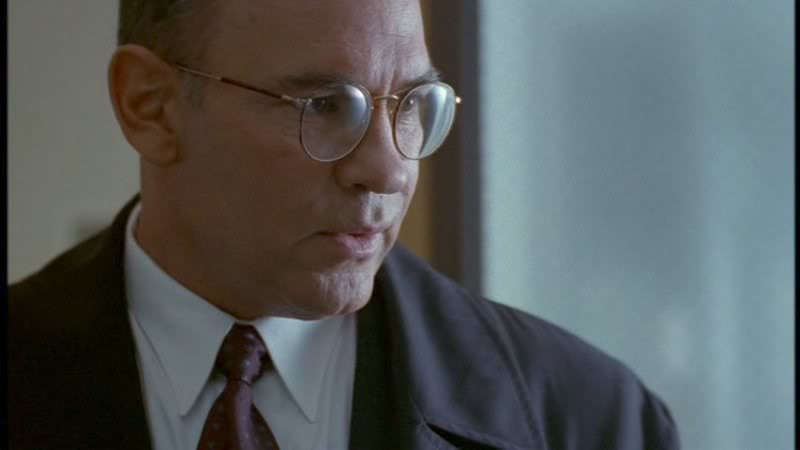
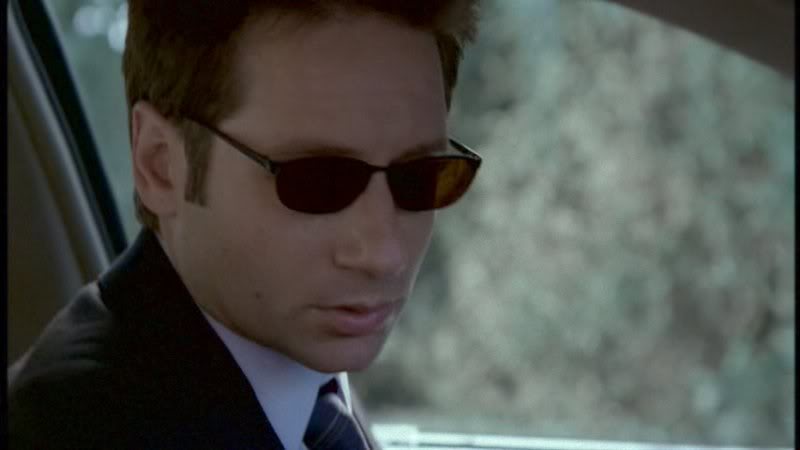
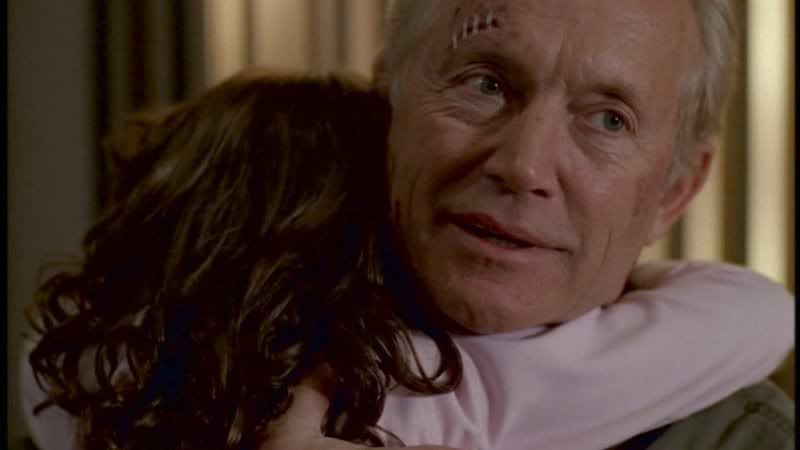
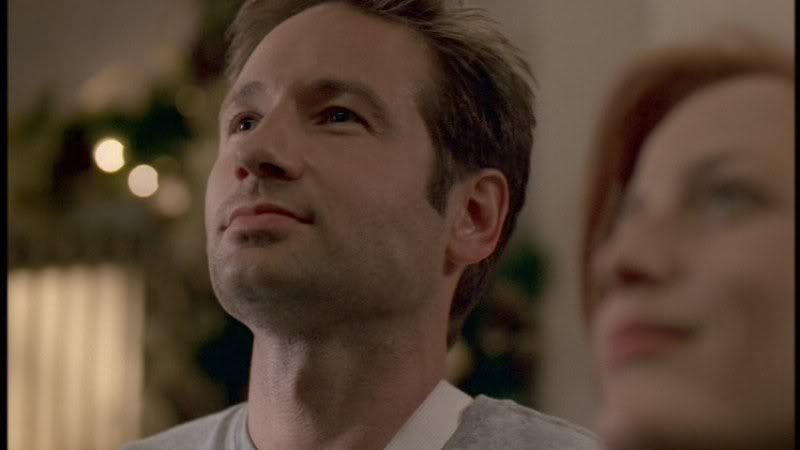
-- The climatic sequence of "Millennium," in which the case is wrapped up just in time to witness that time-honored television tradition, watching the ball drop in Times Square to the enthusiastic refrains of Dick Clark's New Year's Rockin' Eve, also necessitated special effects intervention.
-- "The problem was, we were shooting in October," explained producer Paul Rabwin, "and so obviously we had no footage of the coming event. At the time, the only picture of what the Millennium Ball would look like was on the Internet. From that photo, Bill Millar digitally created a copy of the year 2000 ball. We then took footage of Dick Clark's 1998 New Year's Eve show and inserted the new ball digitally into the old footage. Finally, we hired Dick Clark to come in and do a year 2000 bit of voiceover work and we had what we needed."
-- Dick Clark, host of American Bandstand and fondly known as "the world's oldest teenager," began producing and hosting Dick Clark's New Year's Rockin' Eve in 1972. The program typically consisted of live remotes of Dick Clark in Times Square in New York City, counting down until the New Year. After the ball dropped, the focus of the program switched to musical segments taped prior to the show in Hollywood. ABC has broadcasted the event every year since 1972 -- except, ironically, in 1999 due to the airing of a news special covering the milestone year hosted by Peter Jennings. However, during the news special, Clark served as a special correspondent and announced his signature countdown to the new millennium. Clark suffered a stroke in 2004 from which he has been slow to recover, but he still manages to make a brief appearance on New Year's Rockin' Eve to welcome in each new year.
-- Although this was the only "crossover" episode between the two series, there was a previous character crossover: Jose Chung (played by Charles Nelson Reilly in both series) in "Jose Chung's 'From Outer Space'" on The X-Files and "Jose Chung's 'Doomsday Defense'" on Millennium, both episodes written by Darin Morgan.
-- Lance Henriksen appeared in James Cameron's directorial debut, Piranha 2: The Spawning. He also appeared in the Cameron-directed The Terminator and Aliens.
-- Romy Walthall (Agent #2) appeared in the fourth and seventh films of The Howling series under the name Romy Windsor.
-- The character of Frank Black from Millennium was named for the lead singer of one of Chris Carter's favorite bands, "The Pixies," and that same Frank Black makes an appearance on the "Songs in the Key of X" soundtrack with the song, "Man of Steel."
-- The necromancer Mark Johnson is named for the real-life Mark Johnson -- the producer who did "Home Fries" with Vince Gilligan.
-- The scripture recited by Mark Johnson as he tried to resurrect Raymond Crouch is John 11:25: "I am the resurrection and the life. He that believeth in me, though he were dead, yet shall he live, and whosoever liveth and believeth in me shall never die."
-- Vince Gilligan's brother Patrick played a sheriff's deputy.
-- Keeping with tradition, there are two references to Vince Gilligan's girlfriend (Lucy "Holly" Hartwell Rice) in "Millennium": much of the action takes place in Rice County, Maryland (a fictional location); and the institution where Frank is staying is the Hartwell Psychiatric Hospital in Virginia -- which is Vince's home state.
-- 11:21, the time the policeman stops to help Mark Johnson with his flat tire, is a reference to Chris Carter's wife's birthday (11/21).
-- The time on the grandfather clock when Frank and Mr. Johnson were discussing Frank becoming the Fourth Horseman ("the time is near") is 10:13, a reference to Chris Carter's birthday (10/13).
-- When Mulder and Scully met Frank Black, he was watching a football game between Boston College and Notre Dame, both well-known Catholic schools; in 1924, Notre Dame's backfield was nicknamed "The Four Horsemen."
-- The Four Horsemen of the Apocalypse are allegorical figures described in Revelations 6:1-6 in the Bible. The Four Horsemen ride horses that are white, red, black, and pale, and as Mulder said in the episode they bring with them war, pestilence, famine, and death.
-- The line "Shoot them in the head, it seems to stop them," is an homage to the original Night of the Living Dead.
-- "Bringing Frank Black to The X-Files was done with a wink, but not really to give the character closure," said Chris Carter. "When you create a character, you never want to give that character closure. But it was a chance to work with Lance again, to do it in an interesting way. And with X-Files we were always trying to figure out new ways to tell stories. It was bold in a certain respect in that it was asking X-Files viewers to accept this sort of hybrid idea, to accept this character into the X-Files as a kind of equal in the story that was told. It was nice to work with Lance again and to have a chance to conclude the Millennium storyline. It was sweet, although I think FOX kind of choked on the fee we had to pay him to get him to do the episode."
-- "It ended up not in fact owing very much at all to what had happened in the Millennium TV series," added Spotnitz. "It ended up being an excuse for bringing Frank back and for seeing him with his daughter, and for telling people what became of him after the show ended. But that was really all it did in terms of bringing closure to Millennium. I think maybe that was enough, but I'm sure that, for Lance and for die-hard fans of the show, it wasn't answering all the questions they might have had. Melding the two worlds of The X-Files and Millennium was a terrible headache to devise -- which we only realized after we'd committed to the idea. It wasn't completely successful, I suppose, but still seems worth it for having brought back Lance Henriksen."
-- But in the end, for most of the fans at least, "Millennium" was always about the kiss. "David and I knew the kiss was coming," related Gillian Anderson. "There was a history and there was potential between Scully and Mulder, and I think that selfishly, wonderfully, the fans just wanted them to be together. I felt the editors milked it in a very effective way. When we were shooting the scene, the director slowed everything down and changed the camera angles. That scene was made to last a lot longer than it actually was."
-- Carter agreed that the final scene was something of a present for the fans. "It was something they had been waiting a long time for. And I'm glad we did not cheapen the gesture for the sake of a ratings grabber. It came about in such a natural way."
-- Although Carter said the "Millennium" kiss was not about grabbing ratings, the episode about the end of the millennium aired in November over Thanksgiving weekend -- during sweeps when grabbing ratings points is more important. The episode would have been more appropriate and poignant had it aired closer to the millennium.
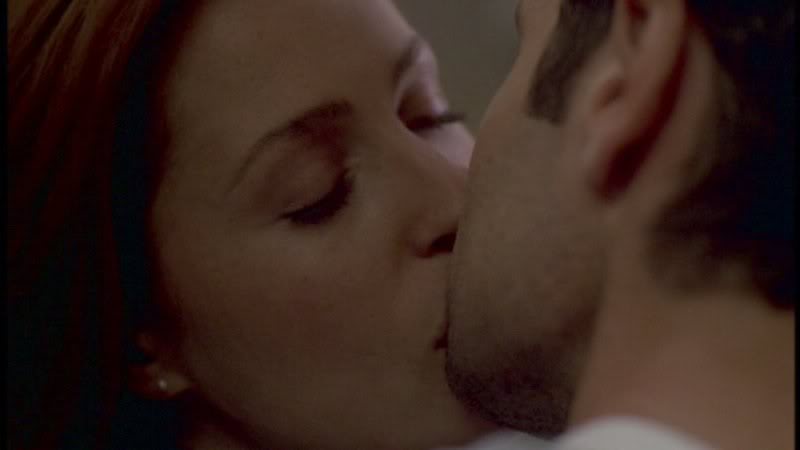
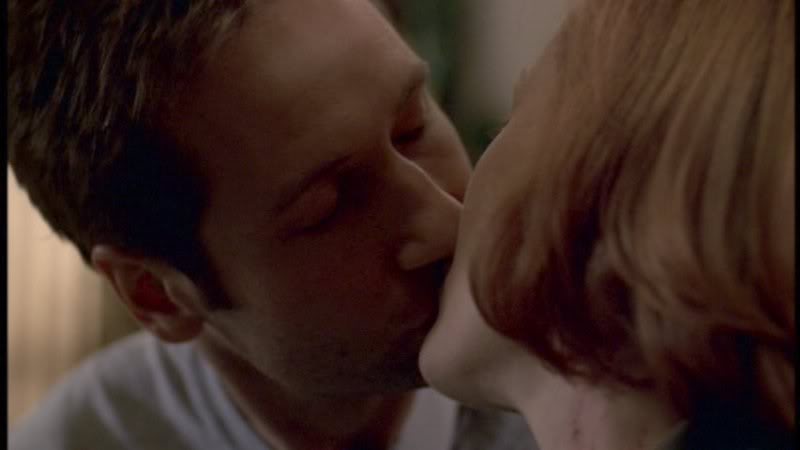
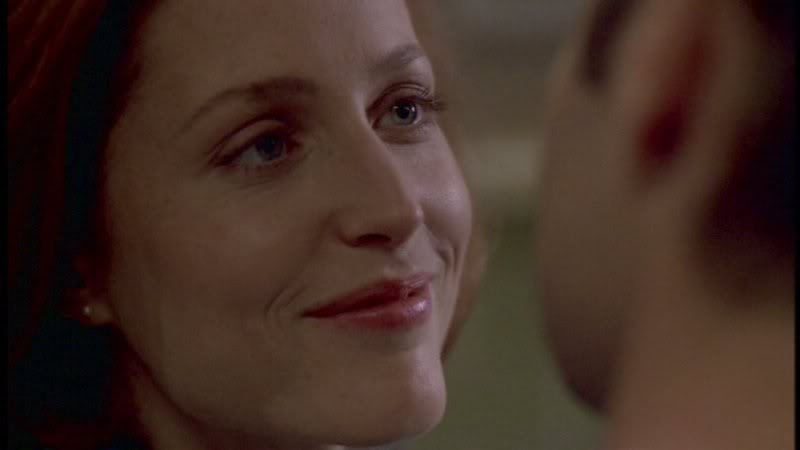
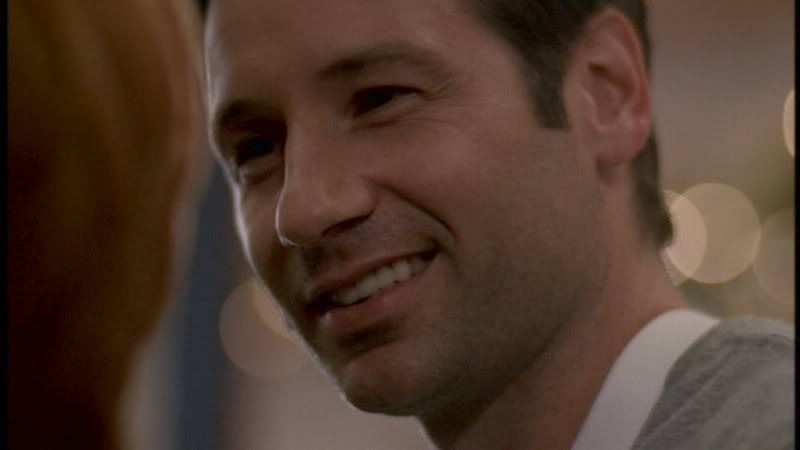
(Thanks to chrisnu for today's pics.)
-- The music at the end of the episode -- taking the "Auld Lang Syne" music from the TV, fading it into a sweeter, simpler version of that tune (which accompanied the kiss perfectly), and then segueing into the little snippet of the X-Files theme at the very end -- Mark Snow at his best.
-- The script for "Millennium" contains this direction concerning the kiss: "The ball drops -- the year '2000' lights up. The TV cuts to Times Square revelers kissing. We rack from this to Mulder and Scully. Who turn, looking at each other. The same thing on both their minds. At last, Mulder moves to kiss Scully. No bee sting intrudes. It's a nice, sweet kiss on the lips. One that lingers maybe a bit longer than a kiss between two friends should. Their lips part, the two partners sharing a tender look." And after the episode-ending dialogue, "As they turn and head down the hall, toward the new year -- and a new beginning ... Fade Out."
-- Once & Future Retreads: Nary a one.
Please share your first impressions, favorite (or cringe-worthy) moments, classic lines, favorite fanfic, nagging questions, repeated viewing observations, etc., as today we celebrate "Millennium."
Polly